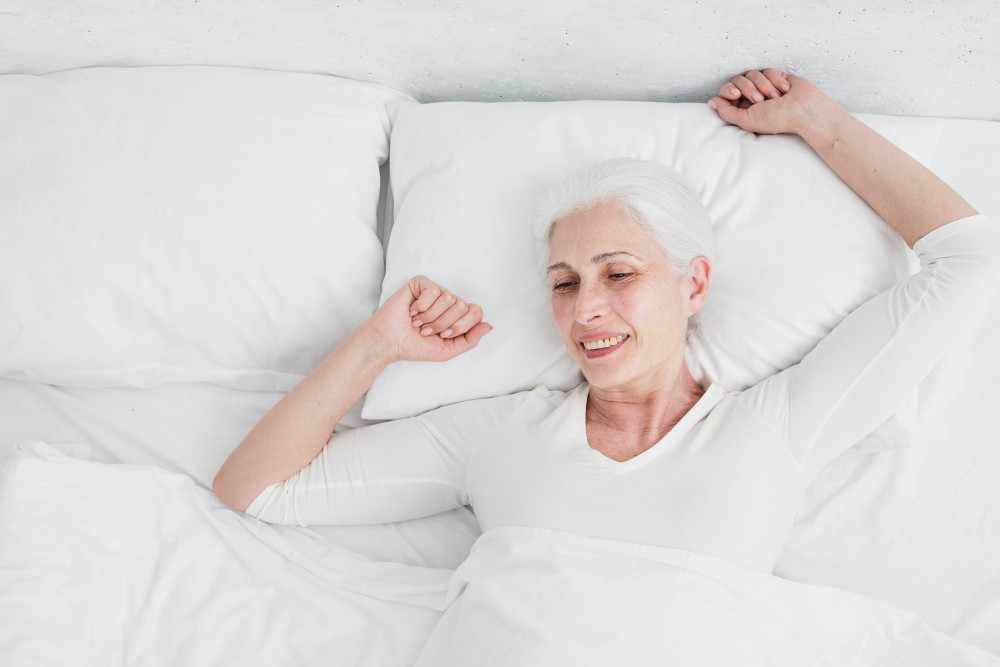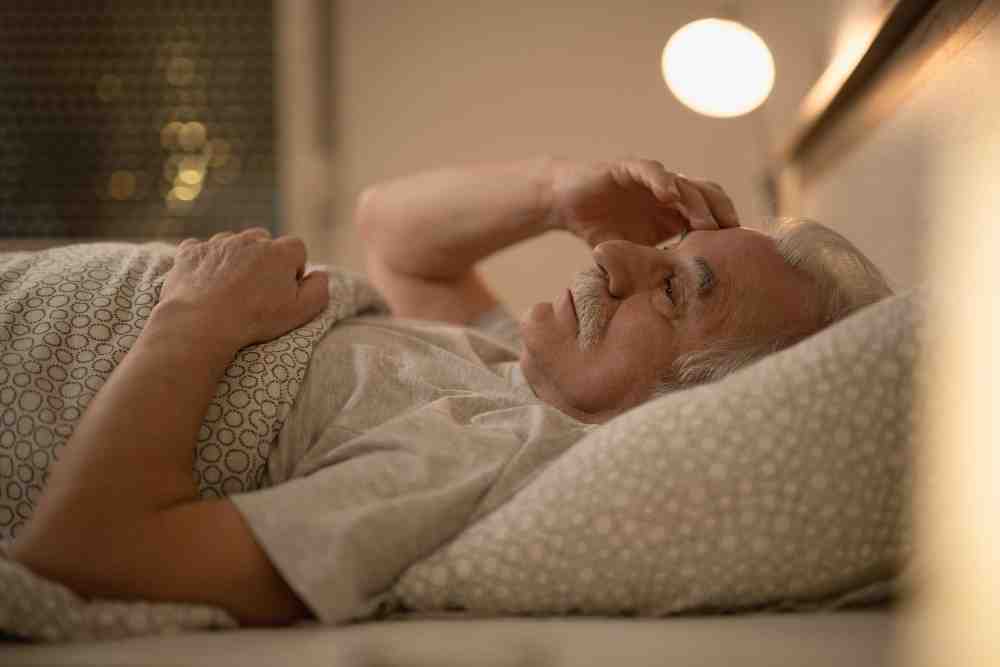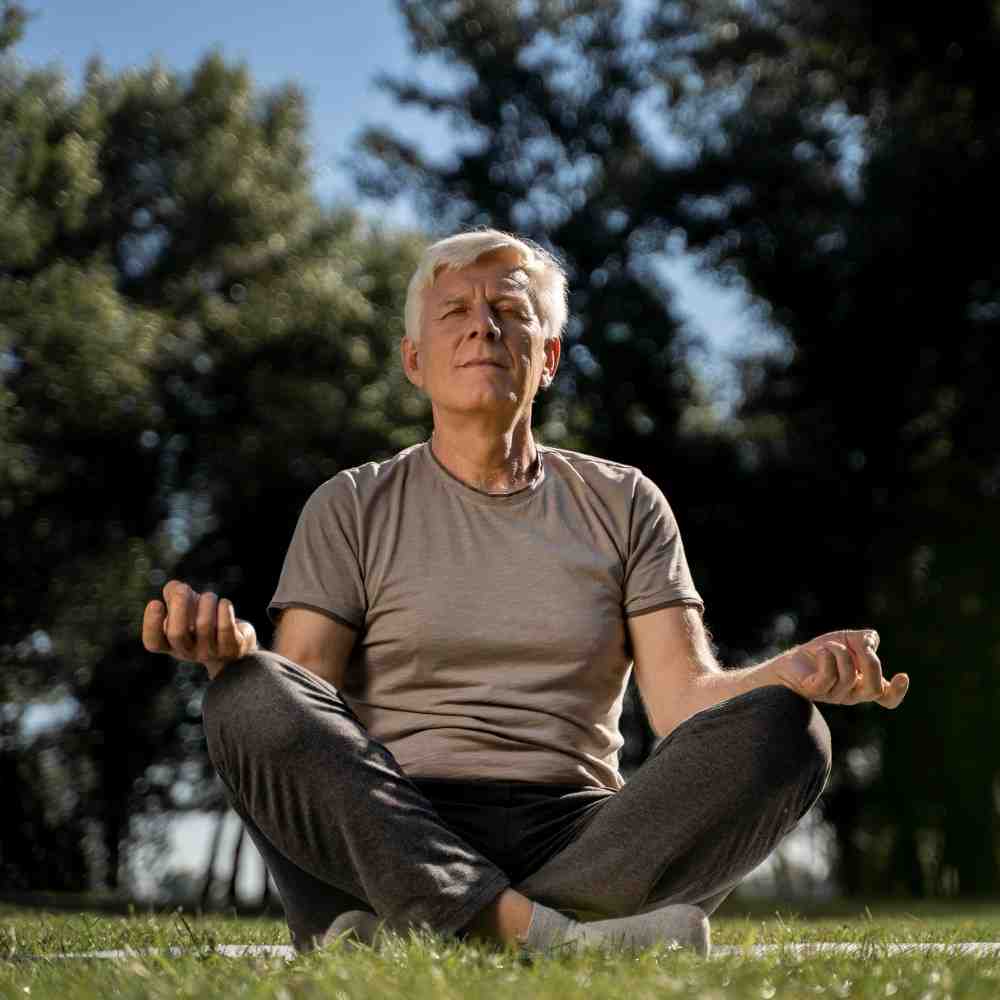Sleep Apnea Symptoms in Seniors-Sleep apnea is often silent but dangerous—especially in seniors. If left untreated, it can affect memory, heart health, mood, and even increase the risk of falls and dementia. This guide will help you recognize the symptoms early and explore simple tools and treatments that make a real difference.
Table of Contents
What Is Sleep Apnea in Older Adults?
Sleep apnea is a sleep disorder where breathing repeatedly stops and starts during the night. The most common form in seniors is Obstructive Sleep Apnea (OSA), caused by relaxed throat muscles blocking the airway.
Many seniors don’t even know they have it. Often, it’s only discovered when a spouse, caregiver, or doctor notices the signs.
10 Common Sleep Apnea Symptoms in Seniors
1. Loud, Frequent Snoring
Not all snoring is dangerous, but when it’s loud, chronic, and accompanied by choking or gasping sounds, it’s a major red flag.
🛏️ Try This: Seniors can benefit from using an anti-snore pillow that promotes better airway alignment.

2. Gasping or Choking During Sleep
If your partner or caregiver notices you suddenly stop breathing, followed by gasping, it’s likely sleep apnea. These episodes can happen hundreds of times per night.
3. Daytime Fatigue or Falling Asleep Easily
Do you feel sleepy even after 7–8 hours of sleep? Untreated apnea causes fragmented sleep, leading to daytime drowsiness, brain fog, and even microsleeps (dangerous during driving or walking).
🌙 Seniors with anxiety or restlessness at bedtime may find relief with a weighted blanket that promotes calmness and deeper rest.

4. Waking with Dry Mouth or Sore Throat
Breathing through the mouth during apnea events can dry out the throat and cause discomfort in the morning.
💡 Pro tip: Keep a humidifier near the bed or try sleeping on your side.
5. Morning Headaches
Low oxygen levels during sleep can cause vascular changes in the brain, triggering dull, pressure-type headaches that often improve later in the day.
6. Memory Loss or Cognitive Fog
Reduced oxygen at night impacts brain function. Seniors may notice forgetfulness, slower processing, or even early signs of confusion. These issues are often misdiagnosed as age-related memory loss when apnea may be the real cause.
🧠 Keep track of oxygen levels at home with a simple finger pulse oximeter.

7. Mood Swings or Depression
Chronic sleep disruption affects neurotransmitters and mood. Seniors may feel irritable, anxious, or low without any clear reason.
8. Frequent Nighttime Urination (Nocturia)
Seniors with sleep apnea often wake up several times to urinate—not always due to a bladder issue but because sleep cycles are constantly interrupted.
9. Trouble Falling or Staying Asleep
Even without full wakefulness, constant micro-arousals break deep sleep. Seniors often describe this as “light” sleep or waking up tired no matter how long they were in bed.
🎵 A white noise machine can improve sleep by calming the mind and masking household or street noise.
10. Dry Eyes or Irritated Skin (CPAP Side Effect)
For seniors already diagnosed and using a CPAP machine, side effects like dry eyes or pressure sores may occur if the equipment isn’t cleaned regularly.
🧼 Use a gentle CPAP cleaning wipe or kit to maintain hygiene and comfort.
🧑⚕️ When Should Seniors See a Doctor?
If you or a loved one has 2 or more of the symptoms above, it’s time to talk to your doctor or a sleep specialist.
They may recommend:
- A Home Sleep Test Kit
- An Overnight Sleep Study (Polysomnography)
- Or simply monitoring symptoms and using lifestyle tools first

🧘 Natural Tips to Manage Mild Sleep Apnea in Seniors
✔️ Use a Side Sleeping Position
Sleeping on your back makes airway collapse more likely. A wedge pillow or body pillow helps.
✔️ Maintain Healthy Weight
Excess weight around the neck increases apnea risk. Chair yoga and light walking are excellent starting points.
✔️ Practice Relaxation Before Bed
Stress worsens breathing issues. Seniors often find gentle chair yoga helpful for calming the mind.
🪑 Download our Free Chair Yoga + Sleep Tracker
👉 Click here to get it from chairyoga.blog
❓ FAQ for Sleep Apnea Symptoms in Seniors
🤔 Can sleep apnea cause memory problems in older adults?
Yes. Poor oxygen flow during sleep may impact brain health, contributing to memory loss or confusion in seniors.
💤 Is snoring always a sign of sleep apnea?
Not always, but loud snoring combined with gasping, choking, or daytime tiredness is a strong sign. Seniors should get checked.
🧓 Is sleep apnea common after age 60?
Yes. Muscle tone loss, weight gain, and chronic health issues make sleep apnea more common in seniors.
🌿 Are there natural remedies for senior sleep apnea?
Yes. Weight loss, side sleeping, using special pillows, white noise, and chair yoga can help manage mild cases naturally.
🩺 Final Words for Sleep Apnea Symptoms in Seniors
Sleep apnea is silent—but it’s not harmless. Catching symptoms early can dramatically improve a senior’s quality of life, energy, and even brain health.
👉 Whether you choose a pillow, a white noise machine, or gentle yoga, taking that first step can lead to better sleep — and a better life.
